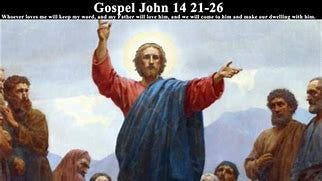Hearing and Obeying Thy Words, Manifest Thyself to Us, O' Lord...
Gospel Reflection for May 19, 2025. Jn 14: 21-26
"He who has my commandments and keeps them, he it is who loves me. But he who loves me will be loved by my Father, and I will love him and manifest myself to him.” Judas, not the Iscariot, said to him, “Lord, how is it that thou art about to manifest thyself to us, and not to the world?” Jesus answered and said to him, “If anyone loves me, he will keep my word, and my Father will love him, and we will come to him and make our abode with him. He who does not love me does not keep my words. And the word that you have heard is not mine, but the Father’s who sent me. These things I have spoken to you while yet dwelling with you. But the Advocate, the Holy Spirit, who the Father will send in my name, he will teach you all things and bring to your mind whatever I have said to you.” (Jn 14: 21-26 NCE)
Today’s reading from the Acts of the Apostles (and Responsorial Psalm 115) provides a useful foundation unto John’s Gospel. In the Gospel, the truth between the relationship of God the Father and the Son is further unveiled in a message of love and how to love by keeping faithful to Christ’s Word, while alluding to His slight departure. Christ, in turn, speaks of the Holy Spirit, who will be sent as a helper or “advocate” for His disciples to understand deeply the meaning of His words, by which the Father and the Son can always dwell with them.
The first reading is from the Acts of the Apostles. Here, Paul and Barnabas, already having had initial difficulty with both Jews and Gentiles in another city, find further challenges in the Greek city of Lystra. Both the reading and the psalm acknowledge the theological difficulties found in pagan Hellenistic cosmology. However, the Greeks were continuously seeking out the mysteries of the Divine through philosophy and logic, and despite the hardened hearts of the Jews, historically, the Hebrews were indeed the arbiters of the concept of a one, true God. So, there are quite notable attributes of both cultures and God, of course, knew this. In fact, our Catholic Faith is rooted in both Abrahamic/Mosaic theology and the metaphysics of classical realism. And although the message from Paul and Barnabas wasn’t well received by the Greeks, it just shows how difficult it is for many to hear the truth when they are just not used to hearing it—especially something as profound as a singular God worthy of obeyance. But we can hear, and we can obey because we have experienced the love of God brought forth through the words of Christ.
“…And we will come to him and make our abode with him.” (Jn 14:23)
And so, today’s Gospel message from John is really a message of love and hope for all, as we encounter Jesus preempting a future where the disciples would soon know of the union between He and the Father—revealed through the Holy Spirit. And it is within John’s Gospel that we are introduced to the idea of parousia, which entails a coming of the Holy Spirit, the Paraclete (advocate), by which Christ and the Father will dwell with the loving faithful to guide and instruct, reminding us that Jesus’ Spirit is still with us.1
It may seem to be easier said than done when beckoned to obey the teachings and commandments of Christ. But that is part of our Christian faith journey to increase in virtue, keeping Jesus in our hearts with the help of the Holy Spirit. The authority of God is established in the very Creed we profess—what we believe reinforcing why we believe. And so, in faith, we acknowledge our greatest good is to be found in doing God’s will. After all, it is His will for each of us to be in heaven with Him—and Christ, did His Father’s will perfectly. For what greater a desire is there than desiring eternal happiness for your loved ones? We then, are called by Christ to do His will, to always hear the truth of His words over the words of worldly types, as there can be no love without truth. Recognizing that Christ is both Truth and Love incarnate, we discover the eternal essence of True Love itself. To hear and obey is a holy act of love as His commandments are the living out of His love through our actions that, by nature, have final ends in eternal salvation, eternal happiness together with God.
Oratio: Holy Spirit teach us; shape our minds and all the faculties of our soul to better accommodate God into our hearts, so we can have new life in Christ. Amen.
Cf., “The Collegeville Bible Commentary,” edited by Dianne Bergant, and Robert J. Karris, (Collegeville, Minnesota: The Liturgical Press, 1989) 1005.



Thank you brother. This is great work.
Excellent discourse … thank you